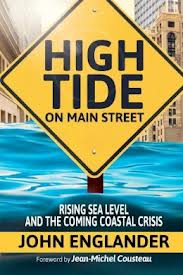“They keep saying that sea levels are rising an’ all this. It’s nowt to do with the icebergs melting, it’s because there’s too many fish in it. Get rid of some of the fish and the water will drop. Simple. Basic science.” – Karl Pilkington, The Ricky Gervais Show
“The most merciful thing in the world, I think, is the inability of the human mind to correlate all its contents… some day the piecing together of dissociated knowledge will open up such terrifying vistas of reality, and of our frightful position therein, that we shall either go mad from the revelation or flee from the light into the peace and safety of a new Dark Age.” ― H.P. Lovecraft, The Call Of Cthulhu
If you’re like me, your knowledge of sea level rise (SLR) is a collection of disconnected, uncorrelated takeaways from this or that article on climate change and its consequences. The writings generally take as a starting point fossil-fuel emissions, greenhouse gases, and radiative transfer. They then explore the consequences for atmospheric temperatures, patterns of drought and flood; and the impacts in turn on agriculture, ecosystems, and water supplies. Only belatedly do the articles direct attention to the melting of the ice caps and glaciers and sea level rise. A figure or two showing what a submerged Florida coastline might look like provides a punch line. But superficially the rates of SLR look to be no more than centimeters per year, and that distorted, nearly unrecognizable Florida of the future can feel a long way off. What’s more, the discussion is couched in careful distinctions between the differing impacts of ice-pack melting versus glacial melting on sea level; the contributions of such melting versus thermal expansion; the geological effects of glacial rebound and subsidence; comparisons to superposed tides and storm surge; and other complicating factors. Then there are all the uncertainties. It’s head-spinning.
Tempting and natural to take false comfort in the Karl Pilkington quip or other such dismissive thought, push the subject out of mind, and move on with daily life.
Would you like to advance beyond that? Would you be willing to invest a couple of hours’ reading in put the whole subject in a coherent framework? John Englander, an oceanographer, diver, consultant and author, has just what you need. It’s the 2013 (second) edition of his book High Tide on Main Street: Rising Sea Level and the Coming Coastal Crisis, available in hardcopy and e-book formats on amazon.com. It’s all there in some 200 pages of flowing, easy-to-follow writing that makes a compelling narrative: a billion years of geology and paleoclimate; a closer look at events since the last Ice Age; a detailing of the changes underway over the past century and continuing and accelerating into the present; the implications for the world’s cities (considered city by city); for economic growth; for property values and the outlook for other forms of investment; and how all this weaves into and legal issues and public policies. The book then segues from the descriptive to the prescriptive: options for action.
Mr. Englander likens our situation to learning we have cancer, and then after the shock wears off, getting on with the business of life. Remarkably he does this in such a way that the reader is encouraged, rather than falling into a Lovecraft/Cthulhu-ian funk.
Give it a read! It’ll be worth your while. Want to go further? You can follow the example of business associations, law firms, and other groups and invite this thoughtful, passionate, humorous, down-to-earth man to give your organization a talk. He’s reachable at john@johnenglander.net.



Bill:-
According to NOAA, the current rate of sea level rise is 3 mm/yr, not cm. That’s 10 inches by the end of the century. And best evidence I can find is that total amount of ice is stable or maybe slightly growing. Hard for me to get worked up about sea level rise. Unless of course we moved all of our politicians to Antarctica – their hot air would really melt some ice!